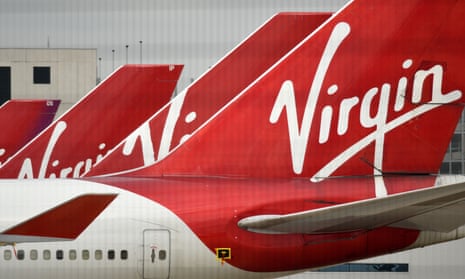Virgin Atlantic has filed for bankrupt protection from creditors in the US, according to a court filing in New York on Tuesday.
The airline is seeking the protection under chapter 15 of the US bankruptcy code, which allows a foreign debtor to shield assets in the country. The announcement comes little more than a month after Virgin Atlantic announced it had secured funding to survive for another 18 months.
Virgin Atlantic flies only long-haul international routes and suspended flights in April due to the coronavirus pandemic.
The bankruptcy is the second from a Virgin Group airline this year. Virgin Australia, the country’s second largest airline, went into administration in April, owing $6.8bn to more than 12,000 creditors.
Virgin Atlantic’s filing in the US bankruptcy court in the southern district of New York said it has negotiated a deal with stakeholders “for a consensual recapitalization” that will get debt off its balance sheet and “immediately position it for sustainable long-term growth”.
On Tuesday the airline also filed a proceeding in the high court in London, where Virgin Atlantic obtained approval on Tuesday to convene meetings of affected creditors to vote on the plan on 25 August.
A Virgin Atlantic spokeswoman said the restructuring plan was before the UK court “to secure approval from all relevant creditors before implementation”.
Bloomberg reported Virgin Atlantic told the high court it could run out of money in September if a restructuring deal is not approved.
Non-US companies use chapter 15 to block creditors who want to file lawsuits or tie up assets in the US.
In July, the airline said its private deal with stakeholders eliminated the need for support from the British government that billionaire founder Richard Branson had sought. The reorganisation is expected to be completed towards the end of this summer and be spread across the next 18 months.
The airline, 51% owned by Branson’s Virgin Group and 49% by US airline Delta, closed its Gatwick base and cut more than 3,500 jobs to contend with the fallout from the Covid-19 pandemic, which has grounded planes and hammered demand for air travel.
It said it needed to recapitalise “to not only survive the exigent threats posed by the Covid-19 global pandemic but to thrive once the immediate global health crisis passes”.
In July, Virgin Atlantic said it had agreed a rescue deal with shareholders and creditors worth £1.2bn ($1.57bn) to secure its future beyond the coronavirus crisis.
Virgin said in a court filing reservations are down 89% from a year ago and current demand for the second half of 2020 is at approximately 25% of 2019 levels. Virgin Atlantic also owns Virgin Atlantic Holidays, a tour operator business and Virgin Atlantic Cargo.
The high-profile Branson had attracted criticism after calling for a government bailout for Virgin Atlantic to survive the downturn.
